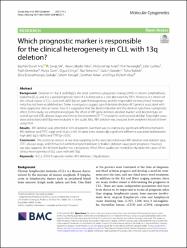Which prognostic marker is responsible for the clinical heterogeneity in CLL with 13q deletion?

View/
Access
info:eu-repo/semantics/openAccessDate
2021Author
Durak Aras, BeyhanIşık, Sevgi
Üsküdar Teke, Hava
Aslan, Abdulvahab
Yavaşoğlu, Filiz
Gülbaş, Zafer
Demirkan, Fatih
Özen, Hülya
Çilingir, Oğuz
İnci, Nur Sena
Günden, Gülçin
Bulduk, Tuba
Erzurumluoğlu Gökalp, Ebru
Kocagil, Sinem
Artan, Sevilhan
Akay, Olga Meltem
Metadata
Show full item recordCitation
Durak Aras, B., Isik, S., Uskudar Teke, H., Aslan, A., Yavasoglu, F., Gulbas, Z., ... & Akay, O. M. (2021). Which prognostic marker is responsible for the clinical heterogeneity in CLL with 13q deletion?. Molecular Cytogenetics, 14(1), 1-7.Abstract
Background
Deletion of 13q14 [del(13q)] is the most common cytogenetic change (50%) in chronic lymphoblastic leukemia (CLL), and it is a good prognostic factor if it is detected as a sole aberration by FISH. However, it is observed the clinical course of CLL cases with del(13q) are quite heterogeneous and the responsible for this clinical heterogeneity has not been established yet. Some investigators suggest type II deletion (include RB1 gene) is associated with more aggressive clinical course. Also, it is suggested that the deletion burden and the deletion type have a prognostic effect. In this study, we aimed to investigate the effect of RB1 gene deletion, deletion burden and deletion type on overall survival (OS), disease stage and time to first treatment (TTFT) in patients with isolated del(3q). Sixty eight cases, detected isolated del(13q) were included in the study. Also, RB1 deletion was analyzed from peripheral blood of them using FISH.
Results
RB1 deletion was detected in 41% of patients, but there was no statistically significant difference between RB1 deletion and TTFT, stage and OS (p > 0.05). At same time, statistically significant difference was detected between high del(13q) (> 80%) and TTFT (p < 0.05).
Conclusion
The statistical analysis of our data regarding to the association between RB1 deletion and deletion type, TTFT, disease stage, and OS has not confirmed type II deletion or biallelic deletion cause poor prognosis. However, our data supports the deletion burden has a prognostic effect. More studies are needed to elucidate the cause of the clinical heterogeneity of CLL cases with del(13q).















